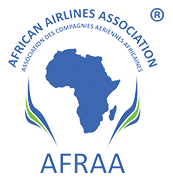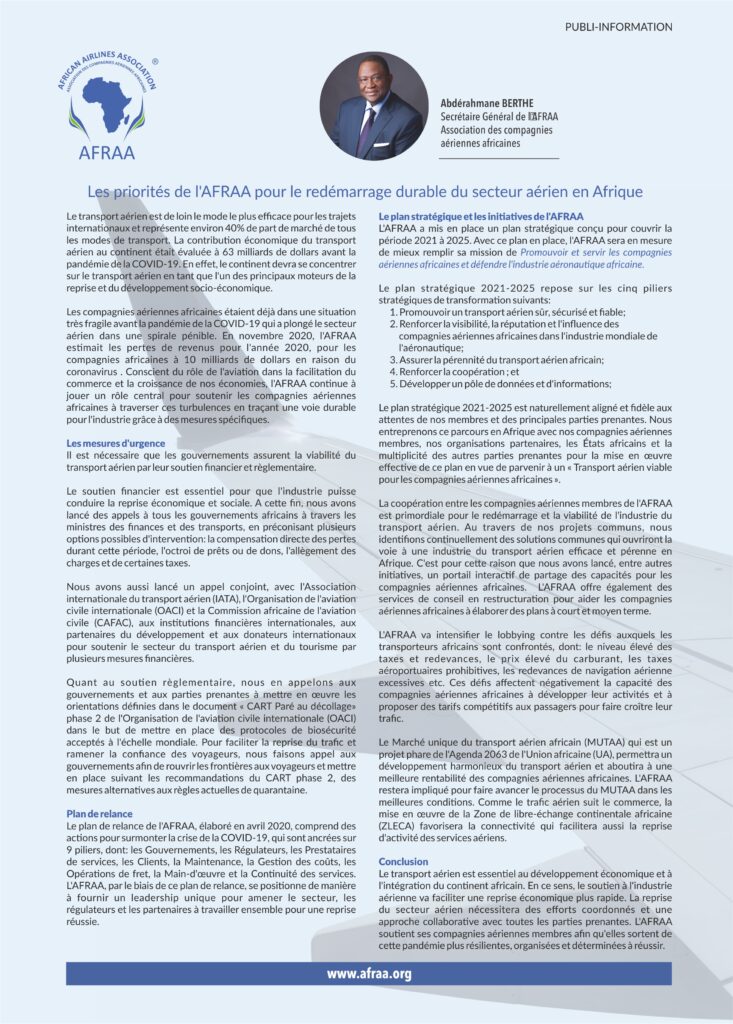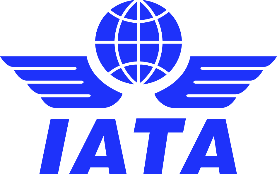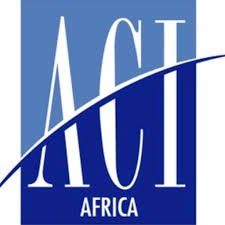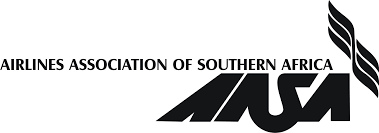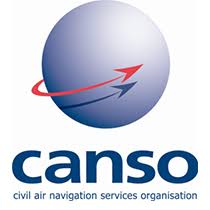The Secretary general of AFRAA discusses how COVID-19 has affected African airlines and progress toward a single African market for commercial aviation.
http://https://www.youtube.com/watch?v=L9ymajA7Y6I&feature=emb_title
Here is a rush transcript of our interview with Abderahmane Berthe.
Victoria Moores: Good morning. My name is Victoria Moores and I’m the European Bureau Chief with Air Transport World magazine. And today I have with me Abderahmane Berthe, who is the secretary general of AFRAA, which is the African Airlines Association. Good morning, Mr. Berthe.
Abderahmane Berthe: Good morning, Victoria.
Victoria Moores: So we find ourselves in a conversation this morning, remotely, because of the situation with COVID. I was wondering, just as a general overview for our listeners, what is the situation with COVID at the moment across Africa? Because it’s a huge continent with lots of different countries. Where is the least and the worst affected by the virus?
Abderahmane Berthe: Thank you. The COVID-19 was declared a pandemic on the 11 March by the World Health Organization and immediately many countries closed their air borders and ground, and activities were very low at that time, because member airlines cannot operate. And since July, we have seen a restart of activities from our members, but still the level of activities is very, very low. We have not yet attained 50% of traffic compared to 2019. So the airlines have been without any revenues for many months. So today the real issue, challenge is a liquidity crisis to restart activities. And during this downtime period, our association has been at the forefront urging the States to support the airlines and also the financial institutions to put in place financial funds to support activities. AFRAA has been also active on the high-level task force, set up by the African Union Commission, which made some recommendations to states to assist African airlines.
Abderahmane Berthe: We, at AFRAA, we have been making some assessment and we think that the risk for airlines is to lose $9 billion dollars of revenues in 2020, compared to 2019. And the fact is, today, that the load factors are very low, even if there is a restart and also the revenue per passenger is very, very low. So airlines are restarting, but they are making losses on the routes they are operating today. And we have only 73 routes which [have been] reopened since September, and we are facing also the challenge of connectivity because all destinations are not yet reopened by member airlines.
Victoria Moores: Mm-hmm (affirmative). You mentioned that you have 73 routes operating. How does that compare with the normal connectivity within Africa? How many routes would your members normally be operating?
Abderahmane Berthe: Normally our members are operating through their hubs to many, many countries. Before COVID-19, almost 22% of passengers were connecting through hubs out of Africa. And today this percentage is increasing, because they are not getting the ideal connections from hubs within Africa, so they have to go out of Africa and come back. So, at AFRAA, we are working on this challenge and we have set up a route network coordination meeting last week with all our members to see how to fill the gaps of connectivity within the continent.
Victoria Moores: Mm-hmm (affirmative). Because connectivity is a very important topic for African airlines in general, we’ve really seen a lot of effort from AFRAA, from IATA, from other associations trying to push, to increase the number of routes and the amount of connectivity within the continent through what’s called the SAATM, the Single African Air Transport Market. Have you seen any further action towards SAATM through this, or has that really put everything to the hold, compared with the pressures of COVID.
Abderahmane Berthe: Before COVID, SAATM implementation was very slow, today we have 34 countries which have signed, committed to SAATM, only 18 countries have in fact modified their bilateral air service agreements to implement the SAATM. We have a working group, under the leadership of the African Civil Aviation Commission, to put in place joint prioritized actions, so that we can implement the SAATM as soon as possible. During this COVID period, the group has been continuing to work on SAATM implementation. We have worked one month ago on some KPIs for the implementation of the Yamoussoukro Decision. And, at AFRAA, we really think that because of the connectivity challenge we are talking about, it’s a very important to implement SAATM. COVID is an opportunity for all states and the all the industries to better understand that implementation of SAATM is key to improve connectivity, intra-Africa. So we are pushing for that and the agenda of works on SAATM is still on, and I think that soon we’ll have a meeting of the group, to see how to progress on the implementation of SAATM.
Victoria Moores: Mm-hmm (affirmative). So in actual fact, the impact of COVID on connectivity, this huge network reset that we’re seeing in Africa could actually accelerate along SAATM and really highlight the importance of having free movement of air links between the African countries.
Abderahmane Berthe: Right. It’s correct. We think that the COVID-19 is showing us that we really need to go toward the Single African Air Transport Market, to facilitate the movement within the continent.
Victoria Moores: Mm-hmm (affirmative). And obviously, financial results, the financial sustainability of the industry itself is also important. African airlines were battling to make a profit before the COVID crisis. Do you have any forecast about the impact that COVID will have on the finances for African airlines, on their profitability?
Abderahmane Berthe: Yes. We think that the financial impact of the COVID on airlines is very huge. And, as you said, before COVID African airlines, they are losing money, they were not profitable, so COVID-19 is aggravating this situation because they are lacking revenues. And as I said, the restart is still very, very slow. And load factors are very low, revenues per passenger are low also, and the cost of operations remain, so it means that they’ll lose more money. And we think that for that reason, the states and shareholders really need to support their airlines. We know that some states have put in place financial support to their airline, but we are asking them to go further in this support.
In April, we have made an assessment of indebtedness of our airlines for 2020, 2021, for the United Nations Economic Commission for Africa, and we have seen that for 16 members who responded, the indebtedness level was $3.2 billion. So we are working, also with African Union and the financial institutions, to put in place – as was recommended by the high level task force of African Union Commission – to put in place the fund of $25 billion to support the industry, not only airlines, but also airports, air navigation service providers. This is very important. The implementation is still a very slow, but we think that by January we can have this fund in place and it will help restart the business. And we also need to bring back confidence of passengers to travel, because of the current situation is very difficult in Africa. We don’t have an harmonization of health screening protocols across the continent, we still have some very high testing costs in some countries, also. This is not helpful to restart activities for our airlines. AFRAA is also advocating to reduce the PCR test cost within Africa, and also to harmonize the protocols and to have mutual recognitions of protocols across the continent, because the difficulty is that in Africa we have 54 countries. If each country has its own protocol, it would be very difficult for airlines and for passengers to travel.
Victoria Moores: So, it’s all about bringing together that jigsaw, all of those pieces, so increasing the number of routes from 73, bringing SAATM into place, getting the financing, and making everything more joined up and unified to protect the airline. It sounds as there is a lot going on for you at the moment there. Thank you very much for joining us this morning, I really appreciate that. And that concludes our interview for today, so thank you.
Abderahmane Berthe: Thank you very much. Thank you.
Victoria Moores: This is Victoria Moores, reporting for Air Transport World.
Source: Aviation Week
